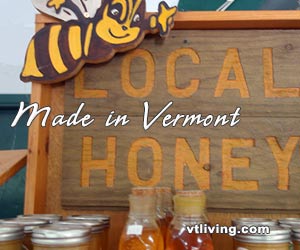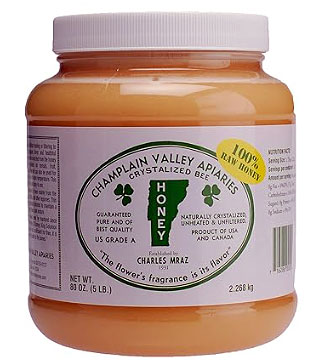Honey New England Apiaries Beekeeping
 Eat more honey. Nature’s sweetener is great in coffee, tea, and on desserts or in place of processed granulated sugar. Shop Raw, natural, unfiltered made in USA honey.
Eat more honey. Nature’s sweetener is great in coffee, tea, and on desserts or in place of processed granulated sugar. Shop Raw, natural, unfiltered made in USA honey.
New England Living Magazine thanks you for supporting local beekeepers, and local apiaries by picking up some honey during your New England travel adventures.
Thank you for sharing your Made in New England products.
Honey in New England: A Sweet Tradition
Honey has been a cherished product in New England for centuries, weaving itself into the cultural and culinary fabric of the region. From its rich colonial history to the modern practices of sustainable beekeeping, honey production in New England is a thriving industry that continues to grow. Let’s explore the diverse world of honey in New England, delving into its apiaries, types of honey, beekeeping associations, and the benefits of honey, all while providing insights for those interested in possibly becoming beekeepers themselves.
 You will love this Made in Vermont Product – it’s absolutely delicious and healthy. 100% Raw Honey By Champlain Valley Apiaries 5lb.
You will love this Made in Vermont Product – it’s absolutely delicious and healthy. 100% Raw Honey By Champlain Valley Apiaries 5lb.
New England Apiaries: Guardians of the Bees
New England is home to numerous apiaries, each with its unique approach to beekeeping and honey production. These apiaries are crucial for the preservation of honeybee populations and the pollination of local crops. Here are a few notable ones:
- Harvard Honey in Massachusetts: Located in the scenic town of Harvard, MA this apiary focuses on sustainable beekeeping practices and produces a variety of honey types, including wildflower and clover honey. Their commitment to education and community outreach makes them a cornerstone of the local beekeeping community.
- Maine Honeybee in Portland, Maine: Known for their artisanal approach, Maine Honeybee offers a range of honey products, including raw honey and beeswax candles. They are dedicated to preserving the health of their bees through organic farming practices.
- Red Bee Apiary in Connecticut: This apiary in Weston, Connecticut, is renowned for its single-origin honey, which highlights the distinct flavors of different floral sources. Their commitment to quality and taste has earned them a loyal following among honey enthusiasts.
Types of Honey in New England
New England’s diverse flora contributes to a wide variety of honey, each with its unique flavor profile and characteristics. Some of the most popular types of honey produced in the region include:
- Wildflower Honey: This honey is made from the nectar of various wildflowers and plants, resulting in a complex and rich flavor that changes with the seasons. It is often considered the most representative of the local terroir.
- Clover Honey: Known for its mild and sweet flavor, clover honey is one of the most common types of honey in New England. It is light in color and versatile, making it a favorite for cooking and baking.
- Blueberry Honey: Produced primarily in Maine, blueberry honey is derived from the nectar of blueberry blossoms. It has a distinct, slightly fruity flavor and a beautiful amber color.
- Goldenrod Honey: This honey has a bold, robust flavor with a slightly spicy undertone. It is typically harvested in late summer when goldenrod plants are in full bloom.
- Buckwheat Honey: Dark and rich, buckwheat honey has a strong, molasses-like flavor. It is less sweet than other types of honey and is often used in baking and cooking for its unique taste.
Beekeeping Associations in New England
Beekeeping associations play a vital role in supporting and educating beekeepers, both novice and experienced. They offer resources, training, and a sense of community for those involved in the practice of beekeeping. Some prominent associations in New England include:
- Massachusetts Beekeepers Association (MBA): The MBA provides educational programs, resources, and networking opportunities for beekeepers across the state. They also advocate for bee-friendly legislation and research.
- Connecticut Beekeepers Association (CBA): With a focus on education and sustainability, the CBA offers workshops, meetings, and events to support beekeepers at all levels. They also run a mentorship program for new beekeepers.
- Maine State Beekeepers Association (MSBA): The MSBA is dedicated to promoting and protecting beekeeping in Maine. They offer a range of resources, including an annual conference, educational programs, and a quarterly newsletter.
- New Hampshire Beekeepers Association (NHBA): The NHBA provides support and education to beekeepers through meetings, workshops, and field days. They also engage in community outreach to raise awareness about the importance of bees.
New England Beekeepers: Stewards of the Hive
Beekeepers are the heart and soul of the honey industry in New England. Their dedication to their bees and their craft ensures the continued production of high-quality honey and the health of local ecosystems. Here are a few notable beekeepers from the region:
- Marina Marchese (Red Bee Honey, Connecticut): Marina is a renowned beekeeper and author, known for her expertise in single-origin honey. Her passion for beekeeping and honey tasting has made her a prominent figure in the industry.
- Dan Conlon (Warm Colors Apiary, Massachusetts): Dan Conlon is a master beekeeper with over 30 years of experience. His apiary, Warm Colors, is known for its sustainable practices and high-quality honey.
- Andrew Coté (Andrew’s Honey, New York/Connecticut): Although based in New York, Andrew Coté manages hives in both New York and Connecticut. He is a fourth-generation beekeeper and a prominent advocate for urban beekeeping.
Becoming a Beekeeper in New England
Becoming a beekeeper in New England is a rewarding endeavor that requires dedication, knowledge, and a passion for bees. Here are some steps to get started:
- Education: Take courses and workshops offered by local beekeeping associations. Books, online resources, and mentorship programs are also valuable for gaining knowledge.
- Equipment: Invest in essential beekeeping equipment, including hives, protective clothing, smokers, and tools for hive maintenance.
- Bees: Purchase bees from reputable suppliers. Options include packaged bees, nucs (nucleus colonies), or established hives.
- Location: Choose a suitable location for your hives, ensuring they have access to ample forage and water.
- Regulations: Familiarize yourself with local regulations and requirements for beekeeping. Register your hives if necessary and comply with any zoning restrictions.
- Maintenance: Regularly inspect and maintain your hives to ensure the health and productivity of your bees. Monitor for pests, diseases, and other issues that could affect your colonies.
The Benefits of Honey
Honey is not only a delicious natural sweetener but also offers numerous health benefits. Some of the key benefits include:
- Antioxidant Properties: Honey is rich in antioxidants, which help protect the body from oxidative stress and reduce the risk of chronic diseases.
- Wound Healing: Due to its antibacterial properties, honey has been used for centuries to treat wounds and burns. It can help promote healing and reduce infection.
- Soothing Coughs and Sore Throats: Honey is a well-known remedy for coughs and sore throats. It can help soothe irritation and provide relief from symptoms.
- Digestive Health: Consuming honey can promote a healthy gut by supporting beneficial bacteria and aiding digestion.
- Energy Boost: The natural sugars in honey provide a quick source of energy, making it a great addition to pre- and post-workout snacks.
- Skin Care: Honey is often used in skincare products for its moisturizing and antibacterial properties. It can help improve skin texture and tone.
New England’s Honey Festivals and Events
Throughout the year, New England hosts various festivals and events celebrating honey and beekeeping. These gatherings provide opportunities to learn, taste, and enjoy all things honey-related. Some popular events include:
- The Maine Harvest Festival (Bangor, ME): This annual event celebrates local agriculture, including honey and beekeeping. It features vendors, workshops, and demonstrations.
- Connecticut Garlic & Harvest Festival (Bethlehem, CT): While primarily focused on garlic, this festival also highlights local honey and beekeeping practices.
- Massachusetts Beekeepers’ Annual Field Day: Hosted by the Massachusetts Beekeepers Association, this event includes educational sessions, hive demonstrations, and vendor exhibits.
- New Hampshire’s Annual Honey Festival (Plymouth, NH): A celebration of honey and beekeeping, this festival features tastings, workshops, and activities for all ages.
Supporting Local Beekeepers
Supporting local beekeepers and their products is essential for the sustainability of the honey industry and the health of local ecosystems. Here are a few ways you can help:
- Buy Local Honey: Purchase honey directly from local beekeepers or at farmers’ markets. This ensures you are getting high-quality, pure honey while supporting local businesses.
- Plant Bee-Friendly Gardens: Planting flowers and plants that provide nectar and pollen can help support local bee populations.
- Reduce Pesticide Use: Limiting the use of pesticides in your garden can create a safer environment for bees and other pollinators.
- Educate Others: Spread awareness about the importance of bees and the challenges they face. Encourage others to support local beekeepers and adopt bee-friendly practices.
A Sweet Ending
Honey in New England is more than just a sweet treat; it is a symbol of tradition, sustainability, and community. From the dedicated beekeepers who care for their hives to the diverse and flavorful types of honey they produce, the region’s honey industry is a testament to the importance of bees in our ecosystem. Whether you are interested in becoming a beekeeper, exploring the health benefits of honey, or simply enjoying its delicious taste, New England offers a wealth of opportunities to engage with this fascinating and vital industry.
For more information about New England Products, bookmark New England Living Magazine.
SHOP HONEY ON SALE
BUY HONEY ONLINE – SHOP NEW ENGLAND PRODUCTS
Shop anytime 24/7 at Free World Mall.
Find Boston Red Sox Gifts, Apparel and more at Red Sox Network


















